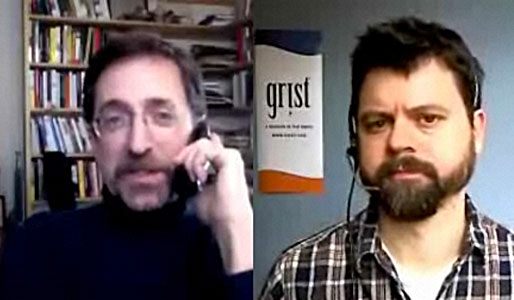Last Friday I did an episode of bloggingheads.tv with Andy Revkin of The New York Times and Pace University. Here it is (try not to be distracted by my constant nodding):
If you don’t want to watch the entire thing, you can watch individual chapters:
The three things Japan has going for it (02:46)
Fighting our tendency to discount long-term risks (09:16)
Preparing for quakes and floods, adapting to climate change (06:07)
Can logic-driven scientists convey an emotional appeal? (12:20)
Republican science, Democratic science, and a cabbie’s wisdom (06:24)
What will it take to change US energy policy? (06:44)
Starting at around 26:15, there’s a discussion about the role of precision and accuracy in climate change communication. I want to follow up on that a bit, since I worry it looks like I’m arguing for being inaccurate. I’m not! Obviously it is wrong to knowingly say something false. Mark me down as anti-lying, even if the lying is in service of a good cause.
But that doesn’t get us very far.
Andy and others argue that those who are struggling to communicate the severity of the climate challenge and prompt action in response to it have a special obligation to be scrupulously accurate — not just accurate in terms of not-lying, but accurate in terms of carefully representing the degree of scientific confidence behind each assertion. So Andy doesn’t it like it when Rep. Henry Waxman (D-Calif.) says climate change “causes more intense snow storms.” He wants Waxman to say, “scientists believe with a 90 percent level of confidence that climate change is a contributing factor in the intensity of snow storms.”
Now, yes, the latter statement is “more accurate” in that it more precisely reflects the findings of science. But the former is not a lie. It’s not false. It’s just a loose, colloquial way of speaking that people use all the time in other circumstances. We say “smoking causes cancer” and no one blinks. That’s because we understand that the precise, hedged, probabilistic language of science is not the only legitimate language. It’s not the only way to tell the truth.
When, for instance, you’re trying to appeal to the public to take measures to respond to a threat to public health, you need language that’s emotionally compelling. You need narrative and drama and imagery. Those needs take precedence over the need for scientific precision.
Andy, of course, views himself as an objective journalist, not an activist. He’s not trying to marshal public reaction, he’s trying to convey information. There’s an interesting argument to be had about that way of viewing journalism, but put that aside.
My objection is that Andy seems to think everyone is obligated to use the dry, precise language of probabilistic science. He and many others spend a great deal of time scolding other journalists or public figures who use language imprecisely, the way Waxman did.
And they specifically argue that imprecise language is a political liability, and that precise language is a political asset. I just see no reason whatsoever to think that’s true. For one thing, supporters of the status quo lie constantly (today’s example) and it doesn’t seem to harm their political fortunes at all — quite the opposite. For another, the language of science is notoriously poor, not only at generating urgency and action but even at generating understanding.
It’s just not a language most people speak or understand. It’s a specialized way of talking. There is, or should be, nothing wrong at all in communicating with the public in the kind of language people do understand, the language of metaphor, analogy, and parable, the language of imagery and association, the language of values and meaning. Doing so is not “inaccurate” and it’s not a political liability. It’s just common sense.
More on this later! Thanks to Andy, as always, for a civil and educational dialogue.



